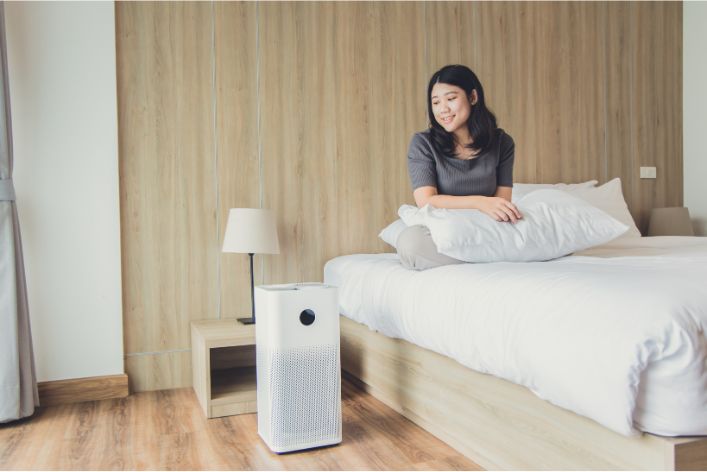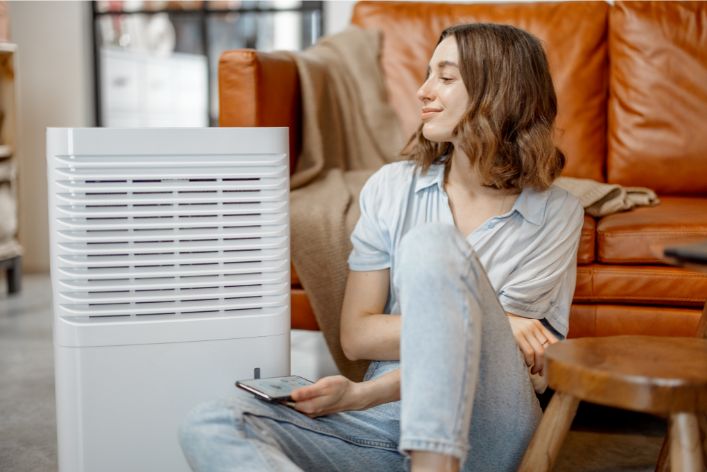Ensuring clean air quality is crucial not just for the environment, but for human health as well. Poor air quality is a silent but deadly threat that affects us all, especially those living in urban areas. Exposure to harmful pollutants in the air can lead to a range of health problems such as respiratory diseases, heart problems, and even cancer.
Research has shown that poor air quality can increase the risk of premature death and lower life expectancy. Children, pregnant women, and the elderly are especially vulnerable to the effects of air pollution. In fact, air pollution is responsible for millions of deaths every year, making it one of the leading causes of global disease burden.

This blog post aims to shed light on the importance of air quality for human health and discuss the impact of poor air quality on our well-being. We will also delve into the common sources of air pollution and how we can protect ourselves from its harmful effects. Additionally, we’ll explore some of the innovative solutions that are being developed to improve air quality and create a healthier environment for everyone.
Read: Can Owning a Pet Improve Your Health and Well-being?
Understanding Air Quality
The air we breathe is crucial to our well-being, but the quality of our air is constantly threatened by pollution. Air quality, simply put, is the measure of how clean or polluted the air around us is. In this chapter, we will take a closer look at air quality, its causes, and how it can affect human health.
Causes of Air Pollution
- Burning of fossil fuels such as coal, oil, and gas
- Industrial activities such as manufacturing and mining
- Transportation, especially vehicles powered by diesel
- Agricultural activities such as livestock farming and crop burning
- Natural sources such as wildfires and dust storms
These activities release harmful substances into the air, such as particulate matter, ozone, nitrogen dioxide, sulfur dioxide, and carbon monoxide, which can cause serious health problems.
Sources of Air Pollution
Air pollution can come from both human-made and natural sources. While some air pollutants come from human activities, others are created by natural processes like volcanic eruptions and wildfires.
Human-Made Sources
- Transportation: Cars, trucks, buses, and airplanes all contribute to air pollution.
- Industry and Manufacturing: Factories and power plants emit pollutants such as sulfur dioxide and nitrogen oxides.
- Agriculture: Fertilizers and pesticides release toxic chemicals into the air.
Natural Sources
- Wildfires: These can release large amounts of pollutants into the air.
- Dust and Sandstorms: Winds can pick up dust and sand particles and transport them across large distances.
- Volcanic Eruptions: Volcanic eruptions can release large quantities of ash and other pollutants into the atmosphere.
Read: How to Adapt to Climate Change for Better Health
How Air Pollution Affects Human Health
Air pollution has been linked to a range of health problems, ranging from mild irritation of the eyes, nose, and throat to more serious respiratory and cardiovascular problems.
Respiratory Problems
Exposure to air pollution can lead to respiratory problems such as asthma, bronchitis, and chronic obstructive pulmonary disease (COPD). It can also make existing respiratory conditions worse.
Cardiovascular Problems
Air pollution has also been linked to cardiovascular problems such as heart attacks and stroke. This is because the pollutants in the air can cause inflammation and oxidative stress, which can damage the blood vessels.
Neurological Problems
There is also evidence that air pollution can affect cognitive function and increase the risk of neurological problems such as Parkinson’s disease and Alzheimer’s disease.
Air pollution is a serious problem that affects us all. It can cause a range of health problems, and its effects can be especially devastating for vulnerable populations such as children and the elderly. Understanding the sources and causes of air pollution is the first step in finding ways to address this pressing issue.
Read: How Does Quality Sleep Transform Your Well-being?
How to Improve Air Quality
There are numerous ways to improve air quality, and it is important to take these measures to reduce the negative impact pollution has on our health and the environment. Here are some strategies that can be implemented at an individual, government, and industrial level to ensure better air quality for everyone.
Innovative Tech Solutions, Tailored for You
Our leading tech firm crafts custom software, web & mobile apps, designed with your unique needs in mind. Elevate your business with cutting-edge solutions no one else can offer.
Start NowPlant more trees
Trees absorb carbon dioxide from the air and release oxygen, making them a critical factor in improving air quality. Planting trees in urban and suburban areas can help reduce the amount of pollution in the air and make neighborhoods more pleasant and livable.
Use fewer vehicles
Cars and trucks are a significant source of air pollution, releasing various air pollutants such as carbon monoxide, nitrogen oxides, and particulate matter. Walking, cycling, and public transportation are eco-conscious alternatives that can significantly reduce vehicle emissions.
Promoting walking, cycling, and public transportation
Encouraging more people to walk or bike instead of driving can reduce dependence on cars and help reduce air pollution. Governments can invest in infrastructure such as bike lanes and cycle paths, as well as incentivize people to use public transportation by providing discounts or free passes.
Read: Can Forest Bathing Improve Your Health and Wellness?
Limit industrial pollutions
Factories and power plants are major contributors to air pollution. Governments can enforce regulations and implement monitoring systems to control emission levels and ensure that industries meet emission standards. Industries can also shift towards cleaner technologies and work towards reducing their carbon footprint.
Implement and strictly enforce environmental laws and regulations
Governments can establish and enforce laws and regulations that restrict pollutants and enforce penalties for companies that breach the rules. These laws should also consider the broader impact of pollutants and their potential to contribute to climate change.
Improving air quality is a vital aspect of ensuring a healthy and sustainable environment. By planting more trees, using fewer vehicles, promoting walking, cycling, and public transportation, limiting industrial pollution, and implementing and enforcing environmental laws and regulations, we can work together to create a cleaner and healthier future for ourselves and generations to come. It is our responsibility to take action and make changes that will positively impact the environment.
Read: The Benefits Of Drinking Water
Personal Actions to Improve Air Quality
It’s easy to overlook the impact our daily actions can have on the air we breathe. However, making some simple changes to our personal habits can significantly improve air quality.
Use Fewer Chemicals in the Home
Many common household cleaning products and air fresheners contain harmful chemicals that can contribute to poor air quality. Consider switching to natural cleaning agents and avoiding aerosol sprays.
Ban Smoking in the Home
Cigarette smoke releases pollutants that can linger in the air for hours. By not allowing smoking in your home, you can reduce the amount of harmful particles and improve indoor air quality.
Buy Eco-friendly Products
When shopping for household items, look for products that are labeled as environmentally friendly. This can include everything from cleaning supplies to furniture and will help to reduce your overall environmental impact.
Use Clean Energy
Fossil fuels are a major source of air pollution, so consider switching to renewable energy sources like solar or wind power. Even small changes like using energy-efficient light bulbs can make a difference in overall air quality.
Regularly Maintain Your Appliances
Over time, appliances like air conditioners and heaters can become clogged with dust and other particles, increasing the amount of pollutants in the air. Regular maintenance and cleaning can help to ensure that these appliances are running efficiently and not contributing to poor air quality.
By making a few simple changes to our daily habits, we can all help to improve the quality of the air we breathe. Whether it’s using natural cleaning products or switching to renewable energy sources, every little bit counts.
Read: Imhotep: The Real Father of Medicine is African!

Benefits of Improving Air Quality
Improving air quality has numerous benefits, including improved health and quality of life. Here are some of the most significant benefits:
1. Improved Health
Poor air quality can lead to a wide range of health problems, such as respiratory diseases, heart diseases, and even cancer. By improving air quality, we can reduce the number of cases of these diseases and improve overall public health.
2. Quality of Life
Indoor and outdoor air pollution can negatively affect our quality of life. Air quality improvements can reduce noise pollution, foul odors, and visual pollution, (such as smog), making the air more pleasant to breathe and enhancing our daily experiences.
3. Reduced Healthcare Expenses
Poor air quality leads to increased healthcare expenses. Treating patients with respiratory diseases or other ailments due to air pollution is a costly endeavor. However, improving air quality can minimize the number of patients receiving treatment, ultimately lowering healthcare expenses.
4. Environmental Protection
When we improve air quality, we start protecting our environment by reducing carbon emissions, reducing the amount of fossil fuels consumed, and limiting the overall environmental impact of human activities. Mitigating pollution reduces ozone depletion and greenhouse gas emissions, promoting cleaner and more sustainable modes of transportation and production.
5. Increased Productivity
Air pollution can negatively impact productivity in a number of ways. For one, it can cause fatigue, making it difficult for workers to concentrate and be productive. Additionally, workers with respiratory ailments may need more sick leaves, leading to more lost workdays. Improved air quality can help reduce these problems, leading to increased productivity.
Improving air quality is key to enjoying the above benefits and more. However, there are some common sense strategies such as:
- Minimizing vehicle usage and gas consumption can lower carbon dioxide emissions.
- Reducing the use of energy and water on our daily activities.
- Increasing indoor air quality by using air purifiers, and ventilating your home or office.
Essentially, it is clear that improving air quality provides a wide range of benefits that can improve our health, environment, and productivity. It’s time for all of us to take responsibility to protect our air quality not only for our health but for our future generations.
Seamless API Connectivity for Next-Level Integration
Unlock limitless possibilities by connecting your systems with a custom API built to perform flawlessly. Stand apart with our solutions that others simply can’t offer.
Get StartedRead: Is Junk Food Cheaper Than Healthy Food?
Conclusion
We have explored the critical issue of air quality and the multitude of factors that contribute to its deterioration. We have learned that air pollution is a global problem that affects both developed and developing countries.
Moreover, we have highlighted some of the detrimental effects of air pollution on human health and the environment. It is clear that urgent action needs to be taken to mitigate the adverse effects of air pollution.
We encourage readers to take individual action toward improved air quality. This can be achieved by reducing personal pollution sources, such as using public transportation, conserving energy, and avoiding idling cars.
It is also important for policymakers to implement measures to curb air pollution, such as strict regulations on industry emissions and promoting sustainable urban planning. Governments should also invest in renewable energy sources to reduce their reliance on fossil fuels.
Looking to the future, it is evident that the air quality issue will remain a significant concern. Nevertheless, we can make strides towards a cleaner and healthier society by working together towards reducing the negative impact of air pollution.
Therefore, let us take individual action and support policies that ensure cleaner air for all, both now and in future generations.
Read: What Happens When We Die?
Before You Go…
Hey, thank you for reading this blog to the end. I hope it was helpful. Let me tell you a little bit about Nicholas Idoko Technologies. We help businesses and companies build an online presence by developing web, mobile, desktop, and blockchain applications.
We also help aspiring software developers and programmers learn the skills they need to have a successful career. Take your first step to becoming a programming boss by joining our Learn To Code academy today!
Be sure to contact us if you need more information or have any questions! We are readily available.










